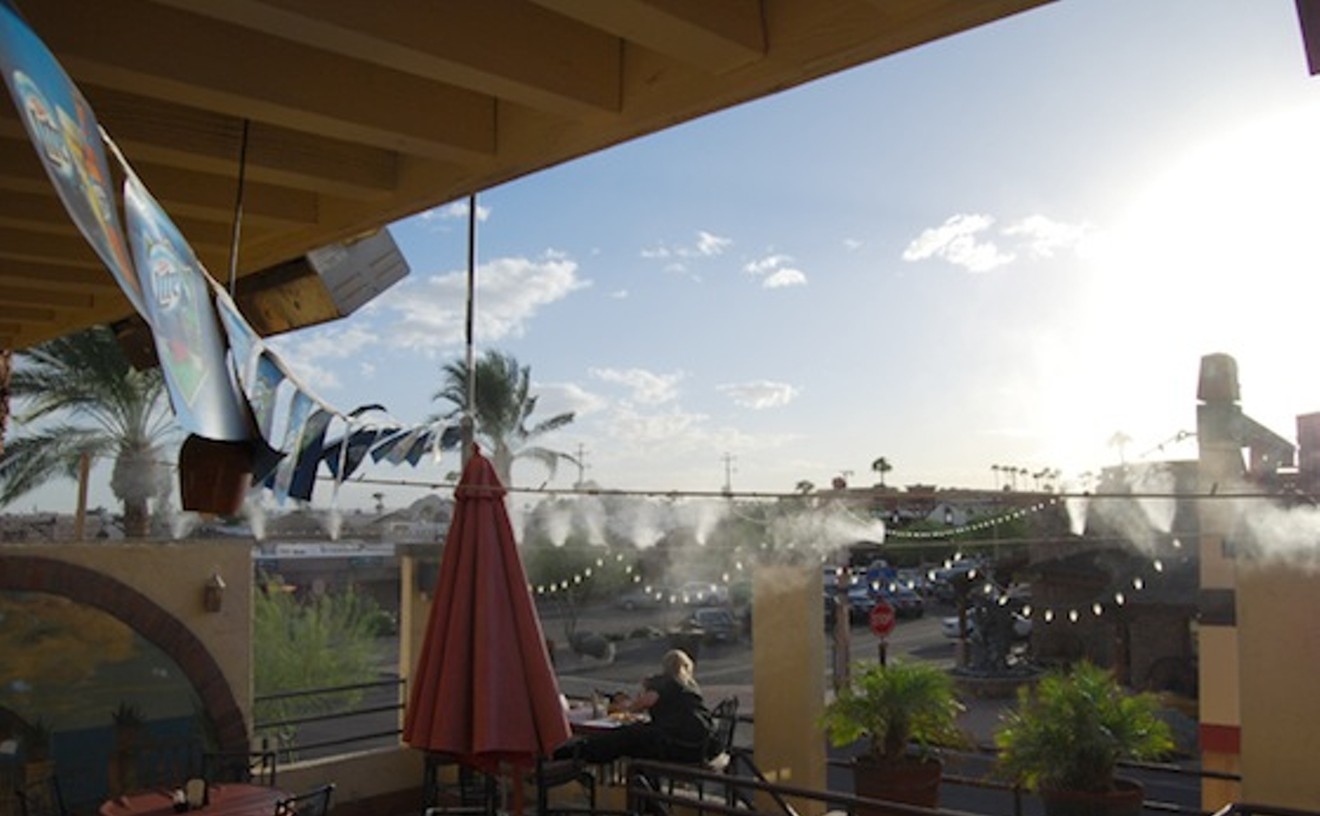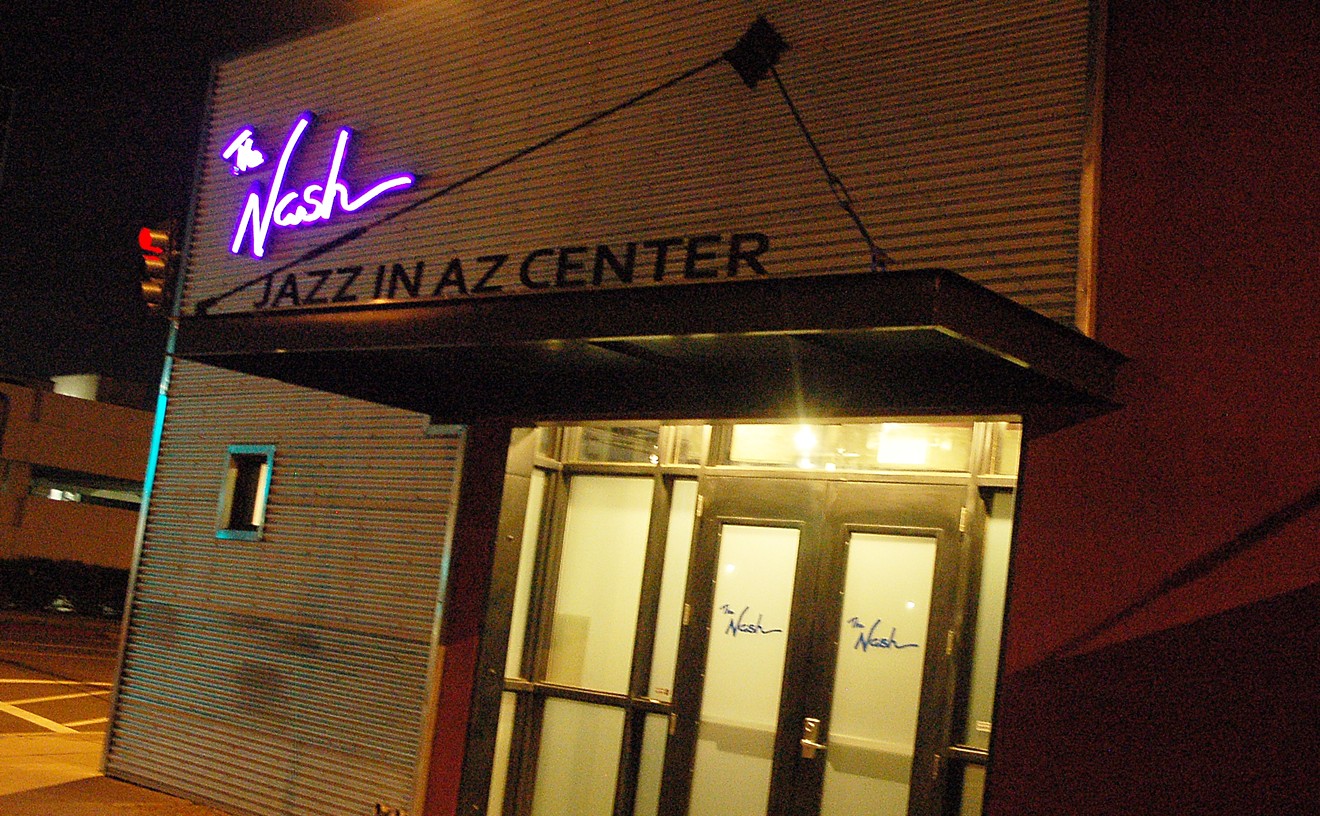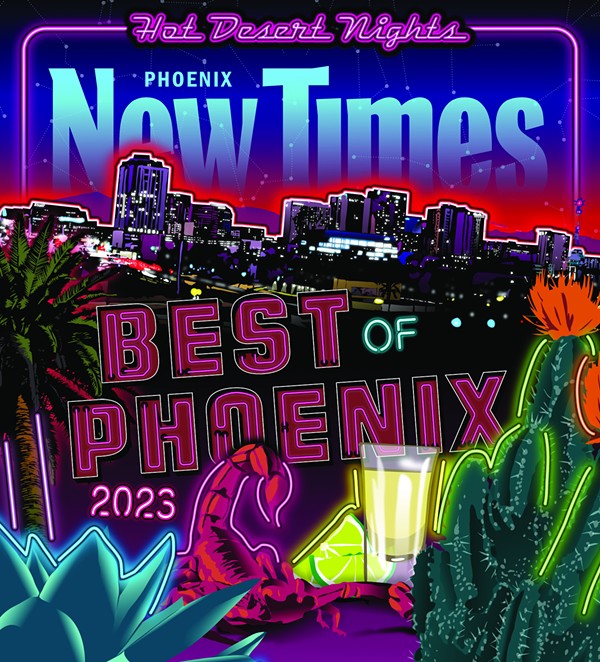It's hard to imagine the Valley's jazz scene before The Nash arrived on Roosevelt Row in 2012 and bopped its way into the hearts and souls of local aficionados of the genre. Since then, the namesake of legendary Phoenix-born drummer Lewis Nash has become the quintessential jazz spot in town and has filled a variety of roles over the past 11 years. It's been a headquarters for local nonprofit Jazz in Arizona, an incubator for student musicians and a speakeasy-style venue showcasing the area's best jazz artists across a variety of traditional, contemporary and experimental styles. We're not the only ones singing the praises of The Nash. DownBeat magazine regularly cites it as one of the "great jazz venues in the world" while iconic trumpeter and composer Wynton Marsalis swears by the place. Other giants of the genre who have also gigged here include pianist Kenny Barron and vocalist Cécile McLorin Salvant. Put simply, Phoenix's jazz landscape is all the more vibrant because of The Nash.
Best Place to See a Metal Show
The 44 Sports Grill & Nightlife
Where's the Valley's best haven for heshers? Spoiler alert: It's not found in live music hotspots like Tempe or downtown Phoenix, nor is it located anywhere east of Central Avenue, period. Instead, follow the sound of heavy-duty riffs, sweet licks and guttural wailings over to the main room of The 44 Sports Grill & Nightlife in Glendale, a ground zero for metal maniacs in recent years. Armed with an enormous stage, a top-of-the-line sound system and a dance floor large enough for headbanging or moshing, it offers long-haired metal fanatics an ideal space to rock out. Bands from across the subgenres of the metal multiverse have invaded The 44, ranging from such nationally known groups as Tantric and Green Jellÿ to tributes like Iron Ozzy or the Maynard James Keenan-centric A Perfect Tool. The venue also has supported the local scene by showcasing the next generation of musicians from the School of Rock and hosting a benefit show by Hollywood Gods N' Monsters for a dearly departed metalhead. Those are both causes that would make even the blackest of hearts grow three sizes.
- 4494 W. Peoria Ave., Glendale, 85302 Map
- 623-842-1053
- the44sportsgrillandnightlife.com/
Best Karaoke
The Grapevine Restaurant and Bar

Karaoke crowds are among the most supportive people on earth. Whatever your song choice, whatever your musical talent, if you get up there and sing "Don't Stop Believing" with all your heart, you'll get cheers, applause and possibly a bunch of people singing along with you. At least, that's the vibe whenever we go to The Grapevine, an Old Town Scottsdale hotspot, for karaoke. The two-story space is always busy on the weekends, but the most crowded part of the bar is the karaoke room, where patrons pack in to sing and be serenaded in turn. The karaoke hosts are good about keeping the action moving, and the songbook is extensive — you're sure to find something you want to sing. Just remember to cheer for your fellow crooners when it's your turn to listen.
- 4013 N. Brown Ave., Scottsdale, 85251 Map
- 480-994-1792
- www.grapevineaz.com/
Best Album
AJJ, 'Disposable Everything'
AJJ's eighth full-length album, "Disposable Everything," is very much a record of our times. The newly expanded folk-punk heroes applied their trademark wit and intensity to chronicle a not-so-post-COVID society, expertly capturing the layers of psychic pain we've collectively grappled with since early 2020. Sprinkled across that dissection of our sociopolitical quagmire is even more cultural criticism that's been essential to the band's 20-ish-year career. It's a record about grief and longing and how we've twisted and tortured ourselves collectively into a state of pure madness. Yet at the same time, the band cling to memories of family, and the simple magic of merely playing music together, and that imbues the record with a whole new sheen of, perhaps not optimism, but something close enough. The end result is a multifaceted achievement for AJJ — a collection that sings of deep pain with a slight tinge of hope that maybe we can make it out the other side together. The record doesn't offer guidance or insight into achieving that fate, but you'll find yourself a mighty companion for the weird days ahead.
Best Hip-Hop Artist
Mega Ran
Why do we keep crowning Raheem Jarbo, better known as Mega Ran, as the best the Valley's hip-hop community has to offer? It ain't from any lack of competition, as Phoenix's scene is rife with top-shelf talents. Instead, Jarbo's sheer mastery of his craft, nonstop hustle and success in both hip-hop and geek circles make him an easy choice. On the mic, the teacher-turned-rapper is absolute fire, weaving deft rhymes, clever lyrics and effortless flows into collaborations with iconic artists like Del the Funky Homosapien or tracks about wrestling, video games and other nerdy subjects. Outside the studio, Jarbo's having one of his biggest years ever and making big moves, including launching the Dream Master Mixtape music festival in Yuma and getting his jams into movies ("Clerks III") and popular games ("River City Girls 2"). He's also earned rave reviews for his latest release, "Buddy's Magic Toy Box," a children's album inspired by his recently adopted son. With many other artists, such a project might seem saccharine, but Jarbo, like anything else he touches, turns it to gold.
Best Band
Phoenix Afrobeat Orchestra
It's hard to believe that Phoenix Afrobeat Orchestra have only been around since 2010. In those 13 years, PAO have truly become an integral part of the local arts scene. Part of that is that the band, founded by musician-activist David Marquez, have always done things exclusively their own way, like waiting six years to release a proper debut album. That "rebellious" streak carries into the music itself, as they've explored the fringes of this robust, multifaceted sound while gigging across the Valley and beyond. Blending everything from funk to folk, that sound remains perfect block-party music even as their political insights and activism infuse their various projects with greater depth and intent. (Their latest album, February 2023's "The Times," expertly encapsulates our weird era with ample warmth and purpose.) Their relationship with the city is one that's ebbed and flowed accordingly, keeping pace with new trends and ideas even as they blaze a trail ever forward through the power of earnest art. PAO are an avatar for this city, and we're glad to have them playing on and on.
Best Retro-Tinged Band
Secret Attraction
Derek Wise seems to live in a state of near-perpetual nostalgia. That persistent, retro-tinged obsession informs the entirety of Wise's band, Secret Attraction. Since the outfit debuted just a few years ago, Wise (who more recently was joined by some other players/collaborators) has cultivated an aesthetic across both the songs and the band's media presence that lands somewhere between a late '80s Cure cover band and an early '90s shoegaze band from the dreary Pacific Northwest. It's a look and feel that's practically made for our fair city, and serves as the perfect soundtrack for late-night rides down city streets or at some dark, totally obscure dive bar with a few close strangers. And also like our city's love of nostalgia, Wise and company aren't just doing it for mere show — there's an earnest passion for these sounds and visuals that makes them feel like powerful expressions of essential ideas and intentions over needless yearning for what's already come to pass. Secret Attraction fully exemplify that vintage life, and they bring us along for the ride with every new project/release.
Best Dance Artist
CHKLZ
When COVID hit, drummer Henri Benard (Okilly Dokilly, Dry River Yacht Club) embraced his inner DJ. Benard, who has previously DJ-ed as DJ Ill Choppo, joined forces with LeMarshawn Jean to form CHKLZ. Over the past few years, the duo have leaned heavily into making some decidedly wild and inventive dance music across a suite of remixes and original cuts. Benard's love and history of big, bold rhythms stands front and center among CHKLZ's output, informing a hypnotic blend of EDM and house music that feels far too propulsive to ever truly escape. But it's not just about big drums, and the duo claim that "CHKLZ is for EVERYONE!" which makes for a motto that cuts to the true heart of all great dance music as a proper builder of communities. It's that mix of a novel approach, big-time musicality and a penchant for inclusiveness and camaraderie that has not only made CHKLZ popular so far (they were invited to DJ a Canadian music festival this past summer) but leaders of a daring and inventive new scene for local dance music. Now enjoy those vibes, doggies.
Best Party Band
Lucky Devils
As a rule, a lot of music can be considered appropriate for parties. (Heck, even emo music has become the inspiration for its own national series of themed events.) Still, it takes a very special kind of band to facilitate a properly epic party, and that's just what Lucky Devils does every single show. The band operates across the West Coast (with a keen focus on our beloved city) playing weddings, corporate events and other such gigs and outings. (There are also regular showcases at our very own Rhythm Room.) And, sure, wedding bands may not be the dictionary definition of cool, but there's something freeing about a band that understand that the need for fun and frivolity can exist beyond the nightclub. The music itself isn't just a big part of their razzle-dazzle, but it's generally good, including semi-inventive takes on "No Diggity'' by Blackstreet and "Don't Stop Believing" by Journey. Party bands should be able to blend the saccharine and the earnest like threading a needle, and Lucky Devils do it with a huge air of showmanship. Plus, any band that covers both Bach and Beyoncé deserves huge props.
Best DJ
Djentrification
The name Djentrification is not just an edgy moniker for beloved DJ Alex Votichenko (known also simply as "Djents"). He does mean, quite literally, de-gentrification, a politics that runs through his unorthodox, captivating DJ sets but also his work with the community, which is always intertwined with the music. He's a longtime staple at various Phoenix haunts, including Bikini Lounge on Grand Avenue, where he has hosted popular Tuesday-night sets for more than a decade. This summer, the historic tiki bar, thanks in part to the DJ, became the home base for a water drive by activists for people living on the streets in the Phoenix heat. As they went to dance, partygoers hauled in cases of water over to the DJ booth. Here, his sets — masterfully spun on vinyl — incorporate deep cuts, strange beats, music from other eras and places, as if wondering, searching, for how to create art in a gentrifying city. As he told New Times in 2018, "It makes sense to consider sounds and rhythms as potential tools, to hurt or help, to create or destroy." Though of course, that's all unspoken. There's usually a more pressing matter at hand: the night, the music, the dancing, the moving crowd.






